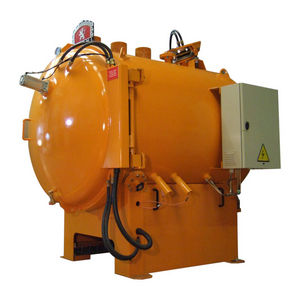
- Industrial machines and equipment
- Furnace and Heat Treatments
- Rotary retort oven
- B.M.I. Fours Industriels
Rotary retort furnace ALLCARB®annealingquenchinghardening
Add to favorites
Compare this product
Characteristics
- Configuration
- rotary retort
- Function
- annealing, quenching, hardening, carburizing, carbonitriding, oxidation, oil quenching, gas quenching, for low-pressure carburizing
- Heat source
- gas
- Atmosphere
- vacuum
- Other characteristics
- high-temperature, graphite, industrial
- Maximum temperature
1,050 °C, 1,250 °C, 1,350 °C, 1,500 °C
(1,922 °F, 2,282 °F, 2,462 °F, 2,732 °F)
Description
Carburizing or carburation is a thermochemical treatment aimed at hardening steels by adding carbon and increasing surface hardness.
Carburizing is a thermochemical treatment aimed at hardening steels by adding carbon and increasing surface hardness. Low-pressure carburizing nowadays is an efficient alternative to conventional carburizsing / carburation techniques, notably bringing about noticeable improvements in homogeneity, penetration and a total absence of intergranular oxidation.
BMI optionally offers the ALLCARB® process for its entire range of high-temperature furnaces (vacuum annealing, vacuum gas quenching and vacuum oil quenching). This technique has been in operation since 1990 in sectors such as aeronautics and the automotive industry. The technique, the use of gas, carburizing and the systems are the subject of numerous patents.
The ALLCARB® technique is distinguished by its industrial results: precise, reproducible and homogeneous. Its use is facilitated by a software assistant, which helps to calculate the cycle parameters according to the depth sought and the steel grade. However, the user retains the possibility of modifying them in order to optimise them for his specific application.
Different from the current low-pressure carburizing techniques, ALLCARB® perfectly meets industrial constraints:
Large / dense load treatments
Deep penetration in cylinder bores
Reduced tolerance of carburised depth
Better control of surface carbon
Catalogs
Related Searches
- Furnace
- Chamber furnace
- Electric furnace
- Heat treatment furnace
- Laboratory furnace
- Combustion furnace
- Gas furnace
- Stainless steel furnace
- Industrial furnace
- High-temperature furnace
- Controlled atmosphere furnace
- Automatic furnace
- Vacuum furnace
- Annealing furnace
- Thermal furnace
- Horizontal furnace
- Sintering furnace
- Quenching furnace
- Compact furnace
- Vertical furnace
*Prices are pre-tax. They exclude delivery charges and customs duties and do not include additional charges for installation or activation options. Prices are indicative only and may vary by country, with changes to the cost of raw materials and exchange rates.





